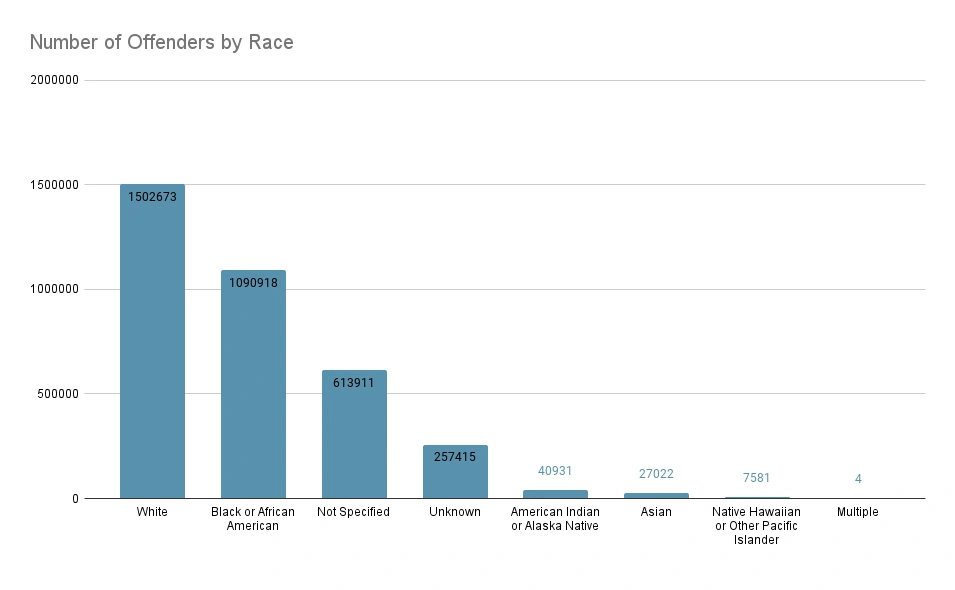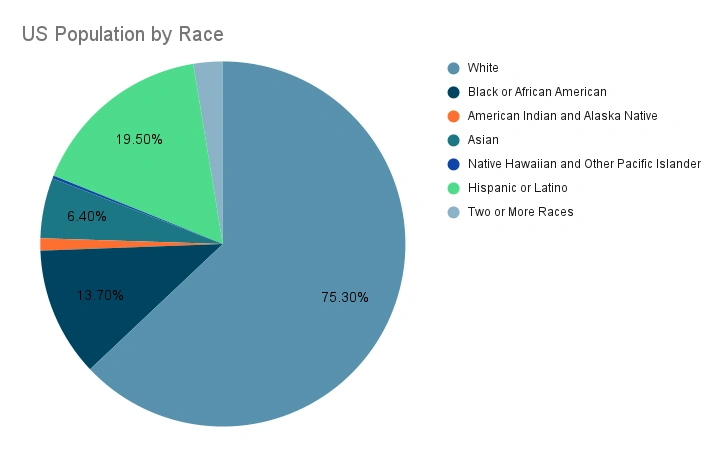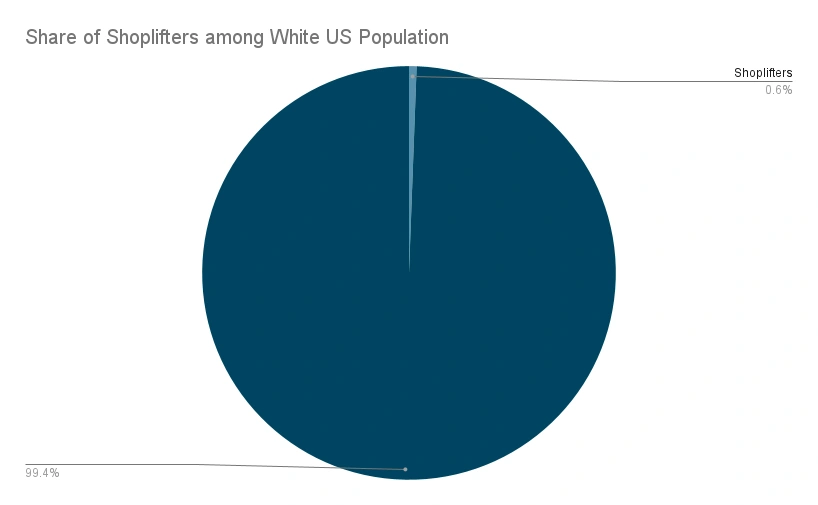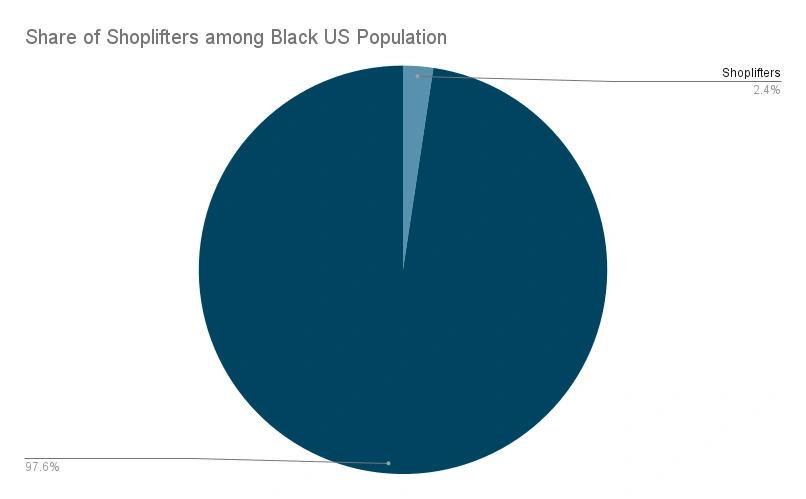Why Are African Americans More Likely to Steal at Christmas Than Others?
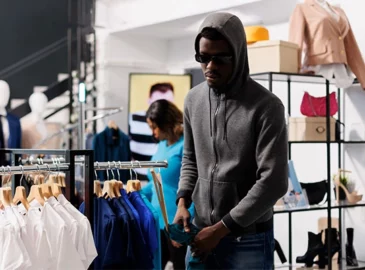
Note: The author's position may not coincide with the opinion of the editorial team.
Shoplifting and theft typically have low income, unemployment, or high debts behind them. If we look at the statistics on this matter, there's an intriguing pattern: Black householders are more likely to have unsecured debt than White-headed families (61.3% vs. 53.4%), and their median debt-to-asset ratio is 50% higher, too. On top of that, Black-headed households had a median income of $56,490 in 2023, which is less than two-thirds of what an average White, not Hispanic householder earned ($89,050).
As Christmas approaches, this topic becomes increasingly hot. Shoplifting increases heavily during the festive season, with the most noticeable spikes in shoplifters' activity being reported in December and January. This pattern has its own reasons. The holiday season comes with increased expenses, so it becomes difficult to make ends meet for low-income Black people. Additionally, as stores have more consumers than usual at Christmas, extra crowds make it easier for shoplifters to steal items without being caught.
What do the official data say?
- African American households have 61.3% unsecured debt, compared to 53.4% for White households (Census.gov), and earn a median income of $56,490, less than two-thirds of the $89,050 median for White households (Census.gov).
- Shoplifting spikes during the holidays, with nearly 46% of retail theft happening in the four weeks before Christmas (CDE).
- 2.38% of Black Americans shoplift compared to only 0.59% of White Americans (CDE).
- Only 37% of shoplifting cases result in arrests, and stores may allow theft under $1,000 to avoid potential harm to employees (CDE).
- Retail theft costs U.S. retailers $95 billion annually, with $1.8 million in merchandise lost each December (LPM).
On the face of it, White people top the list of shoplifting offenders (1,502,673), while Black or African Americans come in second (1,090,918).
It may seem like everything is pretty clear-cut, and the numbers speak for themselves, but there is one thing we're missing: the demographic context. After all, in a country where only forest fairies live, they will make up 100% of shoplifting offenders.
Although the US is far from being a country of forest fairies, the population estimates still need to be taken into account. Black or African Americans make up only 13.7% of the United States population. As the White population makes up 75.3%, this gap explains why the number of shoplifters is higher among the majority group.
However, the shoplifting statistics start to paint a completely different picture when we look at it as a ratio of shoplifters among a particular racial group to the total population of that same group. By making a simple calculation, we can say that approximately 2.38% of Black or African Americans shoplift. To compare, this number is only 0.59% for White people, which is almost five times less.
‘They called me racist’
As I tried to find out whether there is a racial bias in the shoplifters' personalities, I spoke to 23 people involved in the retail industry. Lucie, who was a store manager in 4 different retailers in San Francisco, said that two local stores she worked at in Bayview-Hunters Point (a neighborhood with a large Black people presence) were closed due to unacceptable levels of theft. In one of those cases, this happened right after Christmas.
Nick, who worked as a merchandiser, also said that Black-colored youth were more likely to steal things just in front of him.
"When I tried to stop them, they called me racist and loudly lamented that their skin color made them a target in stores. Skin color, right, not the fact that you just stuffed a bottle of beer into your jacket." Nick noticed.
I also came across the arguments of John Johanson, who spent 18 years as an executive in retail loss prevention with 5 different retailers. According to him, although White women tended to be more of a problem when it came to shoplifting, the game changed significantly with internal theft.
"During my 18 years hands down, Black people were the biggest offenders of internal theft." – John Johanson wrote. "I managed loss prevention stores from coast to coast and border to border, and it was non stop with Blacks stealing. I interviewed thousands of employees for theft, and I can comfortably say 80% were Black employees, and a high percentage of that 80% were Black women."
‘Capitalists love to take advantage of us using the holidays as a cover. Why can't I do the same then?’
By analyzing statistics and personal stories of people working in stores, I see that one of the problems lies in a low shoplifting clearance rate, which was about 37% as of December 2023. This parameter shows the percentage of crimes reported to the police that result in an arrest and charges filed.
Another thing to keep in mind is that official statistics only reflect reported shoplifting cases. Store employees typically don't prevent thefts as they can be physically assaulted by shoplifters. Some stores may even encourage their employees not to do anything, as they don't want the liability if an employee gets murdered. It's literally cheaper for them to let a Black individual steal something than risk an employee getting hurt on the job.
Most stores don't press charges until you hit the point of about $1,000 in stolen items. For example, California law sets this amount at $950. Still, a retailer's loss protection department may let a shoplifter take small amounts of merchandise while they build a case against them.
Nevertheless, shoplifting is something you can easily do without getting caught, which seems attractive to low-income Black Americans as they can cover most of their basics by driving stores into the red. Nowadays, this phenomenon goes far beyond mere need. Christmas is one of the brightest examples of how Black Americans might get gifts and holiday food without even spending a dime.
As I tried to better understand what drives black people to become shoplifters, I spoke with Chris from San Francisco (to protect his privacy, the name has been changed). By his own admission, Chris has been shoplifting each Christmas for at least four years.
"It all started when I was in high school. I had no money because I was only a student and my family was poor. I started shoplifting various stuff from time to time, usually alcohol or snacks. Sometimes, I steal cosmetics to resell them to girls from school. It was so easy that it was almost impossible to get out of that once I realized how it worked and that big stores don't care about you as long as you steal small stuff.
Later, one of my older friends told me that when you're under 18, it doesn't go on your record, but after 18, all these shoplifting cases may impact your adult life and hold you back from getting certain jobs. I gave it up for a while, but when I got married and had a child, the financial stress only increased. Then I thought, Why the hell does it matter if I can't get those jobs anyway while my family needs all this stuff here and now?
I remember when my son turned six, I thought I couldn't leave him without all these Christmas hustles, even though I didn't have a hundred dollars in my wallet. So I just walked into Walmart with an empty baby stroller, threw some gum and lemonade in the cart so that I could look natural, and quietly stowed that LEGO creator and the transformer figure he dreamed of in the stroller. There was such a crowd there before the holidays that I was able to easily sneak the presents out of the store without being noticed. Then I stole lipstick for my wife and also grabbed some home decorations to prepare our apartment for Christmas.
I've done the same every Christmas since that time. I don't think I'm doing much harm to big corporations just by wanting to give my family the holiday they deserve. Let's be honest, capitalists love to take advantage of us using the holidays as a cover. Why can't I do the same then?"
While shoplifters don't admit that they cause any problems with their small theft, the Retail Security Survey released by the National Retail Federation states that retail shrink accounted for nearly $95 billion worth of loss in 2022, which is $5 billion more than the year before.
Most retailers saw a 26.5% increase in organized retail crimes (ORC), which include shoplifting, in 2021. This is not only about the loss of goods. ORC incidents are quite alarming as they often come with violence and aggression. Eight in 10 retailers surveyed report that shoplifters become more and more aggressive during the past year.
On average, ORC cost retailers $777,877 per $1 billion in sales. On top of that, U.S. retailers lose approximately $1.8 million in merchandise in the four weeks leading up to Christmas, while almost half of all the retail theft (46%) happens during the holiday season.
Shoplifting can also have serious consequences for the economy and social life of people in general. While some Black Americans may have just decided to afford Christmas gifts for their families at the expense of capitalists, as they believe, it will be the average hard-working people who follow the laws who ultimately pay for it.
'Every time I point out a shoplifter with a child, I'm not afraid to embarrass them in front of their baby'
The data provided by the US Department of Justice show that shoplifting results in higher prices and unemployment due to business losses and failures. All this affects wages, the job market, and the cost of living.
'I always try to responsibly report shoplifters and help others understand how this crime hurts everyone.' says Kaila, who is a former retail sales worker. 'I know everyone has their own reasons for shoplifting, but I don't want to justify or defend them. I've been through some tough times in my life too, but that shouldn't be an excuse for stealing things.
What they do affects everyone, from the retail stores to just average people like you and I. I've witnessed countless incidents, and it's mind-boggling to me that so many Black Americans not only see their crimes as the only way to please their children at Christmas but actively engage them in the process, setting such a terrible example for future generations.
Most of the time, it's so the parents can't be blamed as it wasn't them, it was their child not knowing what they were doing. Every time I point out a shoplifter with a child, I'm not afraid to embarrass them in front of their baby. Of course, I don't want to. I so badly don't want to. But I do this to show the younger generation that what their parents are doing shouldn't be okay.
Stories like these literally make my hair stand on end. Shoplifting should not be the norm. I don't even try to be empathetic to shoplifters.'
At the same time, 90% of shoplifters point to inflation and the economy as the main reasons for stealing from retailers, without realizing that they only make the situation worse with their own actions.To prevent these losses, we need stricter regulation and more attention to the factors that hide behind shoplifting during holidays.
References
- U.S. Census Bureau - Quick Facts
- U.S. Census Bureau - Wealth by Race
- U.S. Census Bureau - Household Income by Race and Hispanic Origin
- National Institutes of Health - Article on Shoplifting
- UCR - Crime Trends Explorer
- Quora - Are Most Shoplifters Black?
- Elder & Grange Attorneys - Shoplifting Penal Code
- National Retail Federation - National Retail Security Survey 2022
- National Retail Federation - Organized Retail Crime Study 2018
- Loss Prevention Media - Global Retail Theft Barometer
- Office of Justice Programs - Shoplifting: You Pay for It
- CBS News - Shoplifting, Retail Theft, and Inflation
